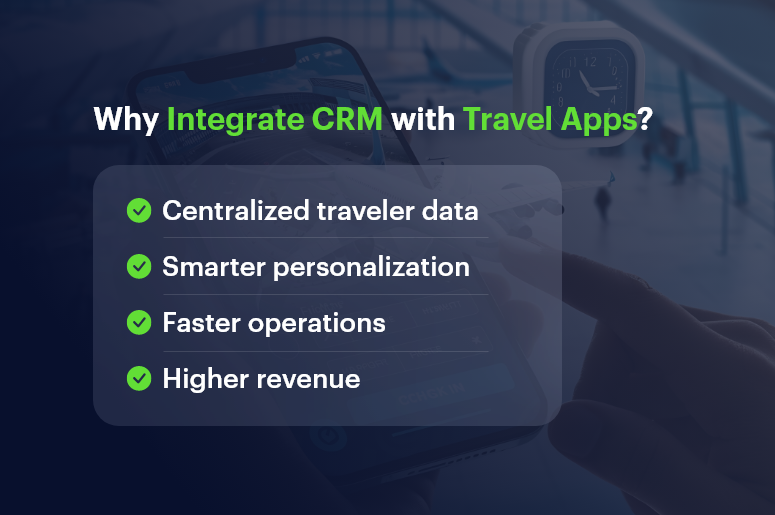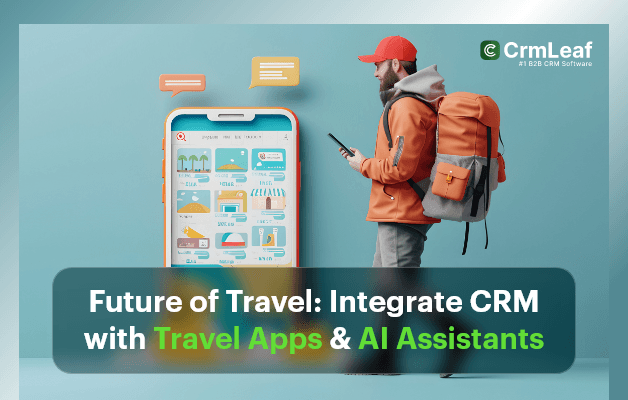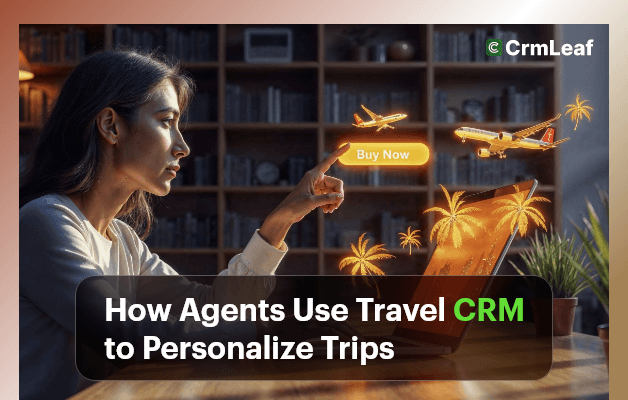The future of travel is being redefined by digital transformation, personalization, and smarter automation. Today’s travelers expect seamless booking, instant support, and tailored recommendations across every touchpoint. Yet, many travel businesses still struggle with fragmented systems, manual processes, and disconnected customer data.
Here’s where the need to integrate CRM with travel apps becomes crucial. Pairing CRM solutions with AI assistants gives travel companies a powerful edge: real-time customer insights, streamlined operations, and personalized services that scale.
In this blog, we’ll explore why CRM integration is the future, how it helps businesses thrive, and actionable strategies to get started.
Why Businesses Need to Integrate CRM with Travel Apps
Travel companies — whether they’re agencies, airlines, or hospitality providers—operate in a highly competitive space. Customer expectations are rising fast, and businesses that can’t keep up risk losing loyalty.
Here’s why integration matters:
- Centralized Customer Data – A CRM unifies traveler details, preferences, and history into one view.
- Personalized Experiences – Integrated travel apps + AI assistants deliver tailored recommendations and offers.
- Operational Efficiency – Automating booking, payments, and communication reduces manual errors.
- Revenue Growth – Smarter upselling and cross-selling opportunities emerge through real-time insights.
- Multi-Industry Impact – From tour operators to corporate travel managers to luxury resorts, CRM integration helps align sales, operations, and customer engagement seamlessly.
Simply put, businesses that integrate CRM with travel apps will be positioned to serve customers faster, smarter, and better than those relying on disconnected systems.

Best Practices to Integrate CRM with Travel Apps & AI Assistants
Integrating CRM with travel apps and AI-powered assistants isn’t just about technology — it’s about reimagining how you deliver customer experiences. Below are actionable best practices:
1. Map the Customer Journey
- Identify touchpoints: booking, itinerary management, in-trip assistance, post-travel follow-up.
- Connect CRM with each step for a complete, 360-degree customer view.
- Example: If a traveler books a flight, your CRM should automatically log preferences, meal requests, and loyalty status.
2. Use AI Travel Assistants for Real-Time Support
- Deploy chatbots and voice assistants for instant travel queries.
- Integrate them with CRM to pull traveler history for contextual responses.
- Example: “Hi John, your flight to Paris is on time. Would you like to add a hotel transfer?”
3. Automate Repetitive Workflows
- Auto-generate invoices, confirmations, and reminders.
- Sync data between CRM and travel management software to avoid duplication.
- Automate lead follow-ups for abandoned bookings or inquiries.
4. Personalize Every Touchpoint
- Recommend packages based on past travel history.
- Use CRM insights to customize loyalty rewards.
- Send AI-powered suggestions: “Since you loved Italy last year, here are curated tours for Spain.”
5. Ensure Mobile-First Experiences
- Travelers book on-the-go. Make sure your CRM integrates with mobile-friendly travel apps.
- Add mobile push notifications synced with CRM campaigns.
6. Focus on Data Security & Compliance
- Travel businesses handle sensitive personal data.
- Use CRMs with GDPR and data encryption features.
- Build trust by being transparent about data usage.
Customer Success Story
WanderGo Tours, a mid-sized travel agency, integrated its CRM with booking apps and an AI travel assistant. Before integration, the team manually handled 70% of bookings, leading to delays and missed upsell opportunities.
After using CRMLeaf, WanderGo:
- Reduced booking errors by 40%
- Increased upselling revenue by 25% with personalized offers
- Cut response times by 60% thanks to AI-powered chat integration
This transformation not only improved efficiency but also built stronger customer loyalty, proving the value of integrating CRM with travel apps.
Key Takeaways
Integrating CRM with travel apps and AI assistants is no longer optional—it’s the future. Businesses that take action today will lead in customer experience and operational efficiency tomorrow.
Key Points to Remember:
- CRM integration centralizes customer data for better decision-making.
- AI assistants enable real-time personalization across bookings and travel support.
- Automation reduces manual errors while improving speed and accuracy.
- Mobile-first strategies keep travelers engaged on-the-go.
- Data security builds long-term trust with customers.
In short, by combining CRM with travel apps, you’re not just managing bookings — you’re creating experiences that win loyalty and drive growth.
FAQs
1. Why should travel businesses integrate CRM with travel apps?
Integrating CRM with travel apps centralizes customer data, enables personalized experiences, automates workflows, and improves operational efficiency. This integration helps businesses serve travelers faster, smarter, and more effectively, while boosting revenue opportunities.
2. How does AI integration enhance CRM in the travel industry?
AI assistants, when integrated with CRM, provide real-time support, contextual recommendations, and automated responses. They help personalize every interaction, reduce response times, and improve traveler satisfaction across bookings, itineraries, and post-travel engagement.
3. What are the key best practices for integrating CRM with travel apps?
Best practices include mapping the entire customer journey, automating repetitive workflows, personalizing interactions using CRM insights, ensuring mobile-friendly experiences, and maintaining robust data security and compliance standards.
4. Can small or mid-sized travel agencies benefit from CRM integration?
Yes. Even smaller travel businesses can reduce manual errors, speed up bookings, upsell effectively, and improve customer loyalty by integrating CRM with travel apps and AI assistants, as demonstrated by success stories like WanderGo Tours.
5. How does CRM integration improve revenue for travel businesses?
CRM integration allows real-time insights into customer preferences and travel history, enabling smarter upselling, cross-selling, and targeted offers. Automation of marketing campaigns and personalized recommendations directly contribute to increased revenue streams.


